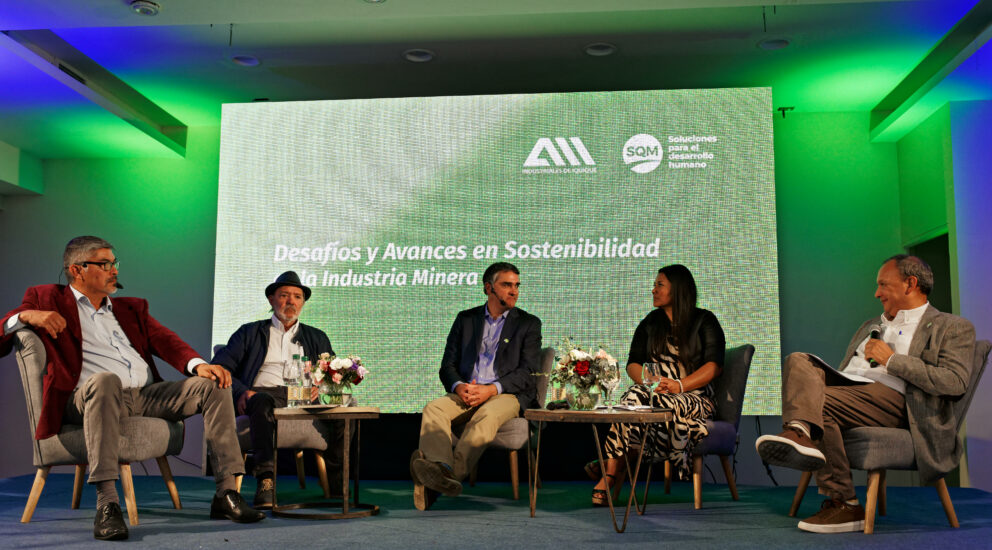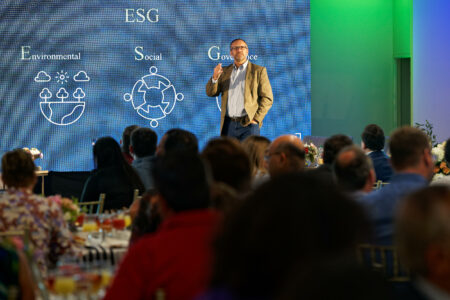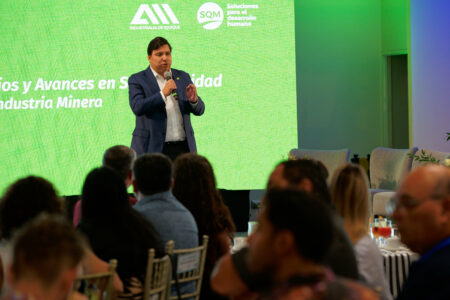
Gonzalo Muñoz, COP25 Champion, speaks in Tarapacá about progress and challenges in sustainable mining
18/Jan/2023
During the event organized by the Iquique and El Tamarugal Industrial Association and SQM, the keynote speaker highlighted the virtues of Tarapacá and the commitment of diverse stakeholders in the transition towards sustainability.
The private sector of the Tarapacá Region, represented by the Iquique Industrial Association (AII) and SQM, together with regional authorities, civil society and academics, gave rise to the event on “Challenges and Progress in Sustainability,” which included a keynote talk by Gonzalo Muñoz, the first COP High-Level Climate Action Champion and leader of Race to Zero, who highlighted the global agenda on environmental issues and how diverse stakeholders must work to make progress on issues such as decarbonization, sustainability and care for the ecosystem.
The event was kicked off by Gonzalo Guerrero, Chairman of the Board of SQM, who spoke about the current challenging scenario facing the country in terms of environmental issues, where engagement and transparency in processes are essential.
The event was led by Pablo Altimiras, SQM’s Nitrates & Iodine Executive Vice President; Jorge Méndez, Secretary of the Board of AII; Carolina Quinteros, Regional Administrator of the Regional Government of Tarapacá (GORE); Miguel Segovia, Dean of the Faculty of Architecture and Engineering of the Universidad Arturo Prat, regional and municipal authorities, and representatives of local companies, startups and entrepreneurs.
During his speech, Gonzalo Muñoz highlighted the multisectoral reach of the event, noting that “these opportunities enrich conversations and we all begin to see problems with the same urgency and to collaborate on solutions for the region, which has many virtues that should be taken advantage of with best practices and a real contribution, where communities benefit from this sustainable progress.”
Regarding the role of the private sector on environmental issues, Muñoz added that “SQM has been exemplary in taking on this commitment, because it is not enough to just say the words. It is an internal issue, where the company paves its own road towards decarbonization, for example.”
In this context, Pablo Altimiras, SQM’s Nitrates & Iodine Executive VP, said, “At our company, we have a robust sustainability plan with three central pillars associated with care for our environment, our people and the development of products that change the world, which have a very important role in health industries, the energy transition and the use of sustainable fertilizer that promotes new environmental practices.”
The executive also announced 2 important projects over the next 4 years in Tarapacá, which involve a US$ 900 million investment, contributing to job creation and the sustainable development of the industry, “considering seawater pipelines, enabling an important transition in the process and making significant progress towards the goal of eliminating the extraction of continental water and meeting the challenge of using 100% seawater in Tarapacá operations by 2030, moving up our initial commitment that was set for 2040.”
Jorge Méndez, Secretary of the Board of AII addressed the matters discussed in the keynote talk, indicating that “it is beyond urgent and relevant for our region, where we need to assume the challenges and work together, contributing as companies to environmental protection and a more sustainable and responsible development with the environment and people. As a trade association, we have been developing a series of initiatives and programs that are focused along these lines.”
From a government perspective, Carolina Quinteros, Regional Administrator of GORE, highlighted the initiative, adding that “the current government plan discusses a logistical ecosystem that is safe and sustainable, where the mining industry has a major impact on the gross domestic product of the region and the country. Therefore, forming part of these types of initiatives is critical to continue to integrate diverse stakeholders around an issue as relevant as the climate emergency.
The event finalized with a conversation panel that included the perspective of the public sector, academics and the business community, with a discussion of the importance of public – private partnerships in contributing to a more sustainable industry.

